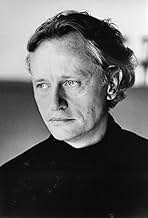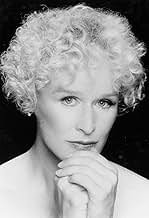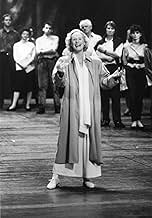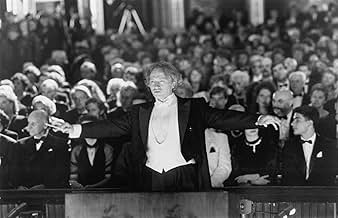IMDb-BEWERTUNG
6,6/10
1466
IHRE BEWERTUNG
Füge eine Handlung in deiner Sprache hinzuHungarian conductor plans bold "Tannhäuser" production amid opera politics, artistic egos, nationalism, union conflicts, and funding challenges in critique of Grand Opera and European Union.Hungarian conductor plans bold "Tannhäuser" production amid opera politics, artistic egos, nationalism, union conflicts, and funding challenges in critique of Grand Opera and European Union.Hungarian conductor plans bold "Tannhäuser" production amid opera politics, artistic egos, nationalism, union conflicts, and funding challenges in critique of Grand Opera and European Union.
- Regie
- Drehbuch
- Hauptbesetzung
- Auszeichnungen
- 3 Gewinne & 2 Nominierungen insgesamt
Kiri Te Kanawa
- Elisabeth (Tannhäuser highlights performed by)
- (Synchronisation)
René Kollo
- Tannhäuser (Tannhäuser highlights performed by)
- (Synchronisation)
Waltraud Meier
- Venus (Tannhäuser highlights performed by)
- (Synchronisation)
Renate Spingler
- A young shepherd (Tannhäuser highlights perfomed by)
- (Synchronisation)
Matthias Hölle
- The Landgrave (Tannhäuser highlights performed by)
- (Synchronisation)
Rodney Macann
- Biterolf (Tannhäuser highlights performed by)
- (Synchronisation)
Johara Farley
- Dancer
- (as Johara Racz)
Dieter Rita Scholl
- Delfin Van Delf
- (as Rita Scholl)
Empfohlene Bewertungen
This film is much more than a customary movie about opera, though opera lovers get first-rate extracts from Wagner's Tannhauser as well. The action takes place in an imaginary "Opera Europe" in Paris. István Szabó, the excellent film director is really interested here in fanatic people of the theater who came from several countries of Europe to unite their talent in order to create a successful performance of Wagner's youthful masterpiece. The ensemble is a mixture of multinational people: the head of the company (a Spaniard, a former hero of the Spanish Civil War,) her private secretary and mistress (descendant of a noble Russian family,) the conductor (a talented young Hungarian who suffers from inferiority complex because of his East-block origin,) the singer who plays Tannhauser (a permanently offended dumpy man from the DDR with beautiful voice,) the French theatrical technician (a pig headed trade unionist who causes much trouble,) etc. They carry with themselves all good and vicious habits and traditions of their origin which cause many conflicts but humorous episodes as well during the rehearsals. There is a remarkable scene when at a dinner party the protagonists put aside all of their conflicts and sing together a song called "Suliko" which was once Stalin's favorite. (They sing it not because they love Stalin, but because of a certain nostalgia for their youth.) In the center of the story stands the Hungarian conductor's and a Nordic singer's (played by Glenn Close) stormy love affair which ends in diminuendo (using here deliberately this term of music.) Strongly recommended for everyone who loves art and theater.
Various musicians and singers of many nationalities led by Hungarian conductor Zoltan Szanto (Niels Arestrup) are gathering in Paris for a new opera performance to celebrate the new Europe. He begins a fling with Karin Anderson (Glenn Close), the star of the show. He has to navigate the jealousy, ambitions, bureaucracy, former communists, national rivalries, and union regulations.
There are some funny bits with the story background. All the chaos has some fun. The romantic plot is a little flat and the drama comes out of nowhere. I didn't realize that he was married. Karin gets hot and cold for unforeseeable reasons. I do like Glenn Close's performance but it can be abrupt. The script should spend a little more time ironing out the drama in the relationship. I don't know much about the music and I don't care that much about it either.
There are some funny bits with the story background. All the chaos has some fun. The romantic plot is a little flat and the drama comes out of nowhere. I didn't realize that he was married. Karin gets hot and cold for unforeseeable reasons. I do like Glenn Close's performance but it can be abrupt. The script should spend a little more time ironing out the drama in the relationship. I don't know much about the music and I don't care that much about it either.
This movie is really something different. It's all about music. It is about the desperate attempt of an idealistic hungarian conductor to perform "Tannhaeuser" in the opera house of Paris. The problems he encounters are unbelievable... and for us viewers, unbelievably funny.
What really is wonderful about this movie is of course the music. It shows how much passion and love lies within classic music, and how much work there is to do until the staff of such a big production is finally in synch.
This film also offers a chance to get an insight into classical music pieces. Some of the most splendid passages of Wagners "Tannhaeuser" can be listened to in full beauty, and thus the film might tempt some people to overcome their inhibitions and to dive into the world of opera.
For those more interested in characterization there are a lot of weird persons playing in this story, showing different kinds of European lifestyle and tackling topics like prejudice, bureaucracy and of course love.
What really is wonderful about this movie is of course the music. It shows how much passion and love lies within classic music, and how much work there is to do until the staff of such a big production is finally in synch.
This film also offers a chance to get an insight into classical music pieces. Some of the most splendid passages of Wagners "Tannhaeuser" can be listened to in full beauty, and thus the film might tempt some people to overcome their inhibitions and to dive into the world of opera.
For those more interested in characterization there are a lot of weird persons playing in this story, showing different kinds of European lifestyle and tackling topics like prejudice, bureaucracy and of course love.
this movie, besides giving the casual viewer a glimpse into the operatic world, also affords the viewer a casual glimpse into the world and the business, of music making, and it ain't pretty. but it's accurate.
as a professional musician in an international setting for more than 25 years, let me assure you that the evils of the music business are all here on display, and they are represented accurately: complaining musicians, managers for whom the word 'know' was replaced by the word 'no' at an early age (perhaps in their infancy), smarmy interfering union reps, and please God, save us all from short conductors with bleeping inferiority complexes.
and then there are the operatic singers. oh my!! (dr. georg szell called opera singers, " 'unmusical beasts', who have to have every note beaten into them by a vocal coach". this is true, by my experience).
the only really weak moment that i noticed was when the conductor left the podium during a rehearsal to knock on the door of the singer. this is absolutely improbable/impossible in my experience. conductors get their 'power' by being on the podium. they do not leave the podium
orchestra conducters get/force sex by more sordid means, not by leaving the podium.
this movie has a lot to recommend it, on many different levels- check it out.
i give it a 9.2.
watch it in a 'Robert Altman' frame of mind, i think that you will see what i mean.
it's not 'terror in tiny town'. and it's not, 'the godfather, part one'. it's somewhere in between. it's really a fine movie.
thanks. alvink
as a professional musician in an international setting for more than 25 years, let me assure you that the evils of the music business are all here on display, and they are represented accurately: complaining musicians, managers for whom the word 'know' was replaced by the word 'no' at an early age (perhaps in their infancy), smarmy interfering union reps, and please God, save us all from short conductors with bleeping inferiority complexes.
and then there are the operatic singers. oh my!! (dr. georg szell called opera singers, " 'unmusical beasts', who have to have every note beaten into them by a vocal coach". this is true, by my experience).
the only really weak moment that i noticed was when the conductor left the podium during a rehearsal to knock on the door of the singer. this is absolutely improbable/impossible in my experience. conductors get their 'power' by being on the podium. they do not leave the podium
orchestra conducters get/force sex by more sordid means, not by leaving the podium.
this movie has a lot to recommend it, on many different levels- check it out.
i give it a 9.2.
watch it in a 'Robert Altman' frame of mind, i think that you will see what i mean.
it's not 'terror in tiny town'. and it's not, 'the godfather, part one'. it's somewhere in between. it's really a fine movie.
thanks. alvink
A Hungarian conductor tries to unite a multi-national European opera company preparing for a televised production of Wagner's Tannhauser, with mixed results. The same might be said of the film itself, which represents director Istvan Szabo's bid for a wider slice of international box office. Unfortunately, what begins as a mild but engaging Murphy's Law comedy (complete with labor disputes, political arguments, artistic conflicts and so forth) soon devolves into a phony feel-good melodrama, with all the comic frustrations of the early scenes jettisoned in favor of a predictably stormy off-stage romance between the conductor and his temperamental superstar diva (Glenn Close). A few incidental pleasures and an attractive, charismatic cast (presenting the entire European community in a fascinating microcosm) aren't enough to hide all the obvious shortcomings, including (but not limited to) shoddy lip-synching, unnecessary voice-over commentary, and the assumption that listening to Wagner is like dying and going to heaven.
Wusstest du schon
- WissenswertesOpera singer Kiri Te Kanawa dubbed the singing voice of lead actress Glenn Close.
- Zitate
Zoltan Szanto: I could mix up my work with my private life.
- SoundtracksTannhäuser
(extraits)
Music by Richard Wagner
Performed by Kiri Te Kanawa, René Kollo, Håkan Hagegård, Waltraud Meier,
Renate Spingler, Matthias Hölle, Kim Begley, Robin Leggate, Rodney Macann,
, Roderick Earle with The Philharmonia Orchestra (as London Philharmonia Orchestra)
Conducted by Marek Janowski
Top-Auswahl
Melde dich zum Bewerten an und greife auf die Watchlist für personalisierte Empfehlungen zu.
- How long is Meeting Venus?Powered by Alexa
Details
- Erscheinungsdatum
- Herkunftsländer
- Sprachen
- Auch bekannt als
- Meeting Venus
- Drehorte
- Produktionsfirmen
- Weitere beteiligte Unternehmen bei IMDbPro anzeigen
Box Office
- Bruttoertrag in den USA und Kanada
- 1.000.348 $
- Eröffnungswochenende in den USA und in Kanada
- 65.715 $
- 17. Nov. 1991
- Weltweiter Bruttoertrag
- 1.000.348 $
Zu dieser Seite beitragen
Bearbeitung vorschlagen oder fehlenden Inhalt hinzufügen














